- Home
- Albert Camus
Resistance, Rebellion, and Death Page 10
Resistance, Rebellion, and Death Read online
Page 10
I must say finally that we don’t want to get you to agree to anything politically. If we wanted to raise the problem on a political basis, we should run the risk of not getting the agreement we need. We may differ as to the necessary solutions and even as to the means of achieving them. To contrast positions that have been defined over and over and even distorted would, for the moment, merely add to the weight of insults and hatreds under which our country is stifling and struggling.
But one thing at least unites all of us—and that is our love of our common soil, and our anguish. Anguish as we face a future that closes up a little every day, as we face the threat of a degrading struggle, of an economic disequilibrium that is already serious and is increasing every day, that may reach the point where no effort will be able to revive Algeria for a long time to come.
We want to address ourselves to that anguish, even—I might say, especially—among those who have already taken sides. For even among the most militant, in the thick of the fray, there is an element, I know, that will not indulge in murder and hatred, and that dreams of a happy Algeria.
We are appealing to that element in each of you, French or Arab. We should like to say to those who are unwilling to see this great country break in two and go adrift that, without recalling again the mistakes of the past, anxious solely for the future, it is possible today, on a single definite point, to agree first and then to save human lives. In this way we may prepare a climate more favorable to a discussion that will at last be reasonable. The intentional modesty of this objective, and yet its importance, make it worthy, in my opinion, of your broadest agreement.
What do we want? Simply to get the Arab movement and the French authorities, without having to make contact or to commit themselves to anything else, to declare simultaneously that for the duration of the fighting the civilian population will on every occasion be respected and protected. Why this measure? The first reason, on which I shall not insist much, is, as I said, one of simple humanity. Whatever the ancient and deep origins of the Algerian tragedy, one fact remains: no cause justifies the death of the innocent. Throughout history, men, unable to suppress war, have made an effort to limit its effects; and, however terrible and repulsive the latest world wars were, nevertheless organizations of aid and solidarity succeeded in piercing the darkness with the feeble ray of pity that keeps one from despairing utterly of mankind. Such a necessity seems even more urgent in a struggle that in many ways has the appearance of a fratricidal war that makes no distinction between men and women, between soldier and worker. From this point of view, even if our present initiative saved but one innocent life, it would be justified.
But it is also justified for other reasons. However black it may seem, the future of Algeria is not yet altogether sealed. If each individual, Arab or French, made an effort to think over his adversary’s motives, at least the basis of a fruitful discussion would be clear. But if the two Algerian populations, each accusing the other of having begun the quarrel, were to hurl themselves against each other in a sort of xenophobic madness, then any chance for understanding would be drowned in blood. It may be, and this is our greatest source of anguish, that we are heading toward such horrors. But we Arabs and French who reject mad, nihilistic destruction cannot let this happen without launching a final appeal to reason.
Reason clearly shows that on this point, at least, French and Arab solidarity is inevitable, in death as in life, in destruction as in hope. The frightful aspect of that solidarity is apparent in the infernal dialectic that whatever kills one side kills the other too, each blaming the other and justifying his violences by the opponent’s violence. The eternal question as to who was first responsible loses all meaning then. And because they could not manage to live together, two populations, similar and different at the same time but equally worthy of respect, are condemned to die together, with rage in their hearts.
But there is also a community of hope that justifies our appeal. That common hope is firmly based on realities over which we have no control. On this soil there are a million Frenchmen who have been here for a century, millions of Moslems, either Arabs or Berbers, who have been here for centuries, and several vigorous religious communities. Those men must live together at the crossroads where history put them. They can do so if they will take a few steps toward each other in an open confrontation. Then our differences ought to help us instead of dividing us. As for me, here as in every domain, I believe only in differences and not in uniformity. First of all, because differences are the roots without which the tree of liberty, the sap of creation and of civilization, dries up. Nevertheless, we stand facing each other as if frozen, as if struck with a paralysis that can be cured only by brutal and brief outbursts of violence. This is because the struggle has assumed an irrevocable aspect that rouses on both sides towering indignations and passions aspiring to outdo each other.
“No further discussion is possible”—that is the slogan that sterilizes any future and any possibility of life. After that there is nothing but blind warfare in which the Frenchman makes up his mind to know nothing of the Arab, even though he feels, somewhere within him, that the Arab’s claim to dignity is justified, and the Arab makes up his mind to know nothing of the Frenchman, even though he feels, somewhere within him, that the Algerian French likewise have a right to security and dignity on our common soil. Locked up in his rancor and hatred, neither one can listen to the other. Any proposal, whichever side it comes from, is received with distrust, distorted at once and made unserviceable. We are gradually getting caught in a tangle of old and new accusations, of fixed vendettas, of relentless rancors alternating with one another. It’s like an old family lawsuit in which grievances and arguments pile up for generations until even the most humane and upright judges can make neither head nor tail of the matter. It is hard to imagine the end of such a situation, and our hope for a Franco-Arabic association, for a peaceful and creative Algeria, becomes dimmer every day.
Consequently, if we want to preserve some of that hope, at least until discussion about the fundamentals gets under way, if we want to help such a discussion get somewhere by making a joint effort toward understanding, we must act upon the very character of the struggle. We are too much hampered by the scope of the drama and the complexity of the passions it has loosed to hope to achieve a cessation of hostilities at once. Such an action would indeed imply the taking of purely political positions which, at the moment, might divide us even more.
But we can at least exert some action on the most hateful aspect of the fight: we can propose, without making any change in the present situation, that we refrain from what makes it unforgivable—the murder of the innocent. The fact that such an agreement would unite French and Arabs, both of them eager not to cause irreparable suffering, would give it a serious chance of succeeding in both camps.
If our proposal had a chance of being accepted—and it does have such a chance—we should not only have saved precious human lives but also have re-created a proper climate for a healthy discussion that would not be spoiled by ridiculously uncompromising attitudes; we should have prepared the ground for a fairer, subtler understanding of the Algerian problem. By bringing about such a slight thaw on a single point, we may hope someday to break altogether the block of hatreds and crazy demands in which we are all caught. Then the various policies would have a hearing and each individual would again have the right to defend his own convictions and to explain his difference.
That, in any case, is the narrow position on which we may hope, as a beginning, to get together. Any broader platform would, for the moment, provide us only an additional field of discord. We must be patient with ourselves.
But I do not believe that any Frenchman or any Arab would refuse to agree to such limited and yet capital action. To convince ourselves of this we have only to imagine what would happen if this enterprise, cautious and limited as it is, were to fail. We should have to face a definitive break, the destruction of all hope, and a carnage of w
hich we have so far had only a slight foretaste. Those of our Arab friends who courageously stand beside us in the no man’s land where we are threatened on both sides and who are torn within themselves would be forced to adopt a policy of retaliation that would kill all possibility of free discussion. The essential dialogue between us could not take place. Directly or indirectly, they would enter the fray, whereas they could have been artisans of peace. Every Frenchman’s interest, therefore, is to help them escape such a dilemma.
But, on the other hand, the direct interest of Arab moderates is to help us escape another dilemma. For if we fail in our undertaking and give proof of our impotence, the French liberals who think that French and Arabs can be made to coexist, who believe that such coexistence will do justice to the rights of both sides, who are sure in any case that it alone can save the people of this country from calamity, will be given the lie.
Instead of the broad community they long for, they will have to fall back on the only living community that justifies them—France. In other words, by our silence or by the stand we take, we too shall enter the fray. I cannot speak in the name of our Arab friends to illustrate both sides of that fearful evolution which gives an urgency to our action. But I have seen how possible such an evolution is in France. Just as I have felt here the Arab’s distrust of whatever is proposed to him, one can feel in France, as you are well aware, a growing doubt and similar distrust. The doubt and distrust may become permanent if the French, already disturbed by the continuation of the Rif war after the Sultan’s return and by the revival of the Fellagha movement in Tunisia, are forced by the spread of a relentless struggle to think that the aim of the struggle is not only the Arab claim to justice but also the achievement of foreign ambitions—at the expense of France and her complete ruin. Many Frenchmen would then indulge in reasoning exactly as the majority of Arabs would reason if, losing all hope, they had to accept the inevitable. The French reasoning would run like this: “We are French. Regard for what is just in the cause of our adversaries will not lead us to do injustice to everything good and deserving in France and her people. We cannot be expected to applaud all forms of nationalism except French nationalism, to forgive all sins except those of France. In the extremity to which we have been driven and since a choice is necessary, we cannot choose anything else but our own country.”
Thus, through the same reasoning operating in contrary directions, our two peoples would separate once and for all and Algeria would become for a long time a mass of ruins, whereas a mere effort of reflection today could still change things and avoid catastrophe.
This is the double danger that threatens us, the mortal risk with which we are faced. Either we shall succeed, on one point at least, in getting together to limit the havoc and shall in this way bring about a satisfactory outcome, or we shall fail to unite and to persuade—and our failure will influence the whole future. Our enterprise needs no other justification; the urgency is evident. This is why my appeal will be as emphatic as possible. If I had the power to give a voice to the solitude and anguish in each of us, that is the voice with which I should address you. As for me, I have passionately loved this land where I was born, I drew from it whatever I am, and in forming friendships I have never made any distinction among the men who live here, whatever their race. Although I have known and shared every form of poverty in which this country abounds, it is for me the land of happiness, of energy, and of creation. And I cannot bear to see it become a land of suffering and hatred.
I know that the great tragedies of history often fascinate men with approaching horror. Paralyzed, they cannot make up their minds to do anything but wait. So they wait, and one day the Gorgon devours them. But I should like to convince you that the spell can be broken, that there is only an illusion of impotence, that strength of heart, intelligence, and courage are enough to stop fate and sometimes reverse it. One has merely to will this, not blindly, but with a firm and reasoned will.
People are too readily resigned to fatality. They are too ready to believe that, after all, nothing but bloodshed makes history progress and that the stronger always progresses at the expense of the weaker. Such fatality exists perhaps. But man’s task is not to accept it or to bow to its laws. If he had accepted it in the earliest ages, we should still be living in prehistoric times. The task of men of culture and faith, in any case, is not to desert historical struggles nor to serve the cruel and inhuman elements in those struggles. It is rather to remain what they are, to help man against what is oppressing him, to favor freedom against the fatalities that close in upon it.
That is the condition under which history really progresses, innovates—in a word, creates. In everything else it repeats itself, like a bleeding mouth that merely vomits forth a wild stammering. Today we are at the stage of stammering, and yet the broadest perspectives are opening up for our century. We are at the stage of a duel with daggers, or almost, while the world is progressing at the speed of supersonic planes. The same day that our newspapers print the dreadful story of our provincial squabbles, they announce the European atomic pool. Tomorrow, if only Europe can come to an internal agreement, floods of riches will cover the continent and, overflowing even to us, will make our problems out of date and our hatreds null and void.
For that still unimaginable but not so distant future we must organize and stand together. The absurd and heart-breaking aspect of the tragedy we are living through comes out in the fact that, in order someday to reach those world-wide perspectives, we must now gather together in paltry fashion to beg merely, without making any other claims yet, that on a single spot of the globe a handful of innocent victims be spared. But since that is our task, however obscure and ungrateful it may be, we must tackle it decisively in order to deserve living someday as free men—in other words, as men who refuse either to practice or to suffer terror.
ALGERIA 1958
(For the sake of those who still ask me what future can be expected for Algeria, I have attempted, in the shortest possible space and staying as close as possible to the Algerian reality, to draw up a brief statement.)
IF THE Arab demands, as they are expressed today, were altogether legitimate, it is probable that Algeria would now be autonomous, with the approval of French opinion. If that opinion nonetheless accepts war and, even among Communists or Communist sympathizers, is limited to platonic protests, this is because, among other reasons, the Arab demands are equivocal. That ambiguity, and the confused reactions it arouses among our governments and throughout the country, explains the ambiguity of the French reaction, the omissions and the uncertainties the French use as an excuse. The first thing to do is to bring some clarity to those demands in order to try to frame clearly the reply that should be made.
A. What is legitimate in the Arab demands.
They are right, and every Frenchman knows this, to point out and reject:
1) Colonialism and its abuses, which are man-made.
2) The perennial lie of constantly proposed but never realized assimilation, a lie that has compromised every evolution since the establishment of colonialism. The faked elections of 1948 in particular both illustrated the lie and utterly discouraged the Arab people. Until that date the Arabs all wanted to be French. After that date a large part of them no longer wanted to be.
3) The obvious injustice of the agrarian allocation and of the distribution of income (sub-proletariat)—injustices that are, moreover, being irreparably aggravated by a rapid increase in population.
4) The psychological suffering: the often scornful or offhand manner of many French, and the development among the Arabs (through a series of stupid measures) of the complex of humiliation that is at the center of the present drama.
The events of 1945 should have been a warning signal; the pitiless repression of the area around Constantine, on the contrary, emphasized the anti-French movement. The French authorities judged that such repression put an end to the rebellion. In fact, it gave the rebellion a starting signal.
It is beyond doubt that the Arab demands on all these points, which in part summed up the historic condition of the Arabs of Algeria until 1948, are thoroughly legitimate. The injustice from which the Arab population has suffered is linked to colonialism itself, to its history and its administration. The French central power has never been in a position to make French law dominate in its colonies. It is beyond doubt, in short, that signal amends must be made to the Algerian people which will restore to them both dignity and justice.
B. What is illegitimate in the Arab demands.
The wish to recover a life of dignity and freedom, the total loss of confidence in any political solution guaranteed by France, the romanticism too that is natural to very young insurgents without political background have combined to lead certain combatants and their general staff to call for national independence. However well disposed one may be toward the Arab demands, one has to admit that, as far as Algeria is concerned, national independence is a conception springing wholly from emotion. There has never yet been an Algerian nation. The Jews, the Turks, the Greeks, the Italians, the Berbers would have just as much right to claim the direction of that virtual nation. At present the Arabs do not alone make up all of Algeria. The size and seniority of the French settlement, in particular, are enough to create a problem that cannot be compared to anything in history. The Algerian French are likewise, and in the strongest meaning of the word, natives. It must be added that a purely Arab Algeria could not achieve the economic independence without which political independence is but a deception. However inadequate the French effort may be, it is so far-reaching that no country, at the present moment, would be willing to take over. For this question and the problems it raises, I refer the reader to Germaine Tillion’s admirable book.1

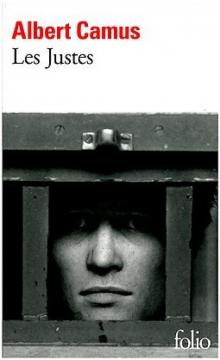 Les Justes
Les Justes The Sea Close By
The Sea Close By The Stranger
The Stranger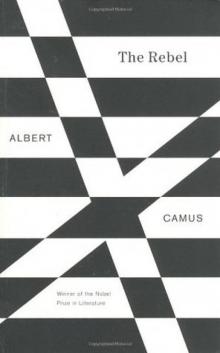 The Rebel: An Essay on Man in Revolt
The Rebel: An Essay on Man in Revolt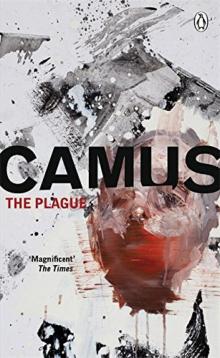 The plague
The plague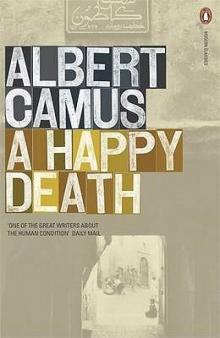 A Happy Death
A Happy Death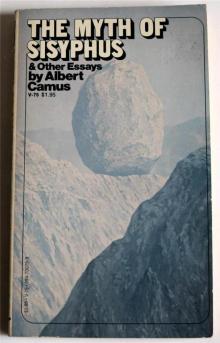 The Myth of Sisyphus and Other Essays
The Myth of Sisyphus and Other Essays The Fall
The Fall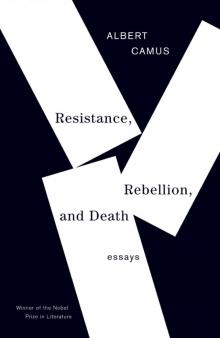 Resistance, Rebellion, and Death
Resistance, Rebellion, and Death The First Man
The First Man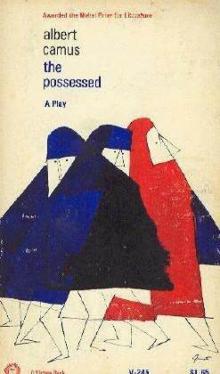 The Possessed
The Possessed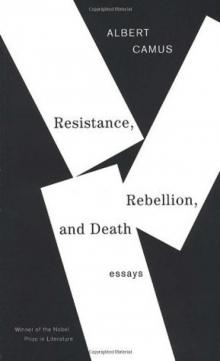 Resistance, Rebellion and Death: Essays
Resistance, Rebellion and Death: Essays